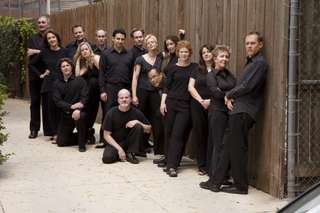|
Back
A poignant emotional journey through the beauties of the Requiem Chicago
Grace Lutheran Church
10/24/2009 -
Cristóbal de Morales: Missa pro Defunctis á 5
Herbert Howells: Requiem – Take Him, Earth, for Cherishing
Bella Voce, Andrew Lewis (Conductor and Artistic Director)

Bella Voce (© SteveLeonardPhoto.com)
When speaking with clinicians, clergy, and others who are intimately involved in the field of death and dying, one is sometimes taken aback by what initially seems a paradox – their conversations are often surprisingly life-affirming and laced with a keen awareness to unexpected joys and warmly-glowing rewards discovered in a process that might be conjectured all gloom. So it is with music written in honor of the dead, something that Bella Voce clearly understands well. Chicago’s scintillating a cappella choral ensemble initiated their 2009/2010 season with a program of requiem repertory spanning four centuries and that, as indicated by conductor Andrew Lewis in a typically insightful pre-performance analysis, revealed some dazzling aural scenery to the listener while gently spiriting one on through a journey of love, mourning, and celestial grace.
Cristóbal de Morales was one of the first great proponents of requiem composition, and several of his offerings stand as classics of the form today. Missa pro Defuntis á 5 saw its premiere in 1544, was soon thereafter heard throughout the Spanish Empire, and was possibly, according to the excellent program notes, also performed at the memorial services for King Charles V in Mexico in 1559. Those whose tastes run toward the choral sonorities of the Renaissance could not have been more pleased by the exquisite vocal blend Bella Voce achieved as the choir made their entry following the piece’s initiation by cantor John Osterhagen. The opening Introitus fielded some particularly lovely work from the tenors, though the technical accomplishment of the entire ensemble consistently impressed throughout, particularly in the skillful dynamic control displayed with the launch into the third strophe of the Kyrie, and in a meltingly beautiful fining away of delicate sound with the which the assemblage graced the final “Amen” in the Sequentia.
As fine as the Morales was, the two Herbert Howells works that closed the program were finer still, and more affectively involving; possibly as they both sprang from intensely personal experiences of private and public grief – one for the loss of a beloved President, the other inspired by the death of Howells own son at the age of nine.
Take Him, Earth, for Cherishing was commissioned for the memorial services at National Cathedral for President John F. Kennedy in 1964. Those of an age to remember the events which inspired this beautiful piece, which draws its text from the writings of the Christian poet Prudentius, will likely find a plethora of memories kindled by its re-acquaintance, from remembrances of the mildly atonal beauty of this music itself, to the horror of that tragic day in Dallas in 1963 and the wrenching sense of loss that transpired; poignantly so with John Kennedy Junior’s salute so touchingly captured on camera amidst the funeral procession. Although the ensemble’s younger members may only resonate to these issues historically, the power of the music itself obliterated such boundaries in a most affectively stirring, precisely coordinated performance – a lulling repetition of the lyric “for cherishing”, emanating here and there through the various vocal categories in the final moments of the piece, was lovely.
Howell’s Requiem was written in 1936 following the death of the composer’s child the previous year; an event that inspired him to pick up his pen and write again after ten silent years. The work lay unperformed until 1981, a brief two years before the composer’s own death. Bella Voce’s admirable performance made the delay all the more lamentable, and one applauds the work’s current presence in the repertory. Psalm 23, the second movement, was given a particularly beautiful reading that was skillfully enhanced by the featured voices of Laura Lynch, Lindsey Adams, Gina McStraw, Doug Kelner and Eric Reese, who here, as elsewhere in the piece, floated delightfully above the choir. The baritone solos of the Psalm 121 were lyrically rendered by Matthew Hayden, who was subsequently complimented by tenor Kelner in the final movement, “I Heard a Voice from Heaven”.
Given the etiology of the piece, the text of this final movement bears further examination:
“I heard a voice from heaven,
saying unto me
Write.
From henceforth, blessed are the dead
which die in the Lord:
even so saith the Spirit,
for they rest from their labours.”
One imagines that Howells took these words profoundly to heart in creating a piece of true, transcendent beauty – here given a performance of resonant grace by the excellent Bella Voce ensemble.
Mark Thomas Ketterson
|